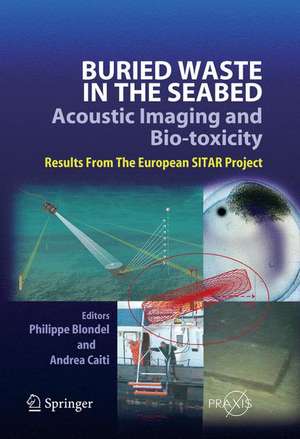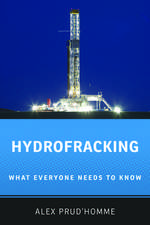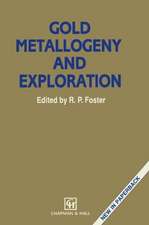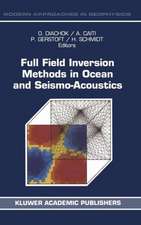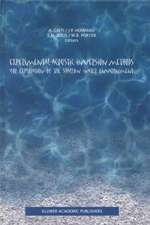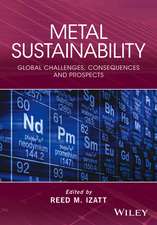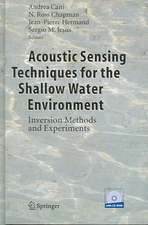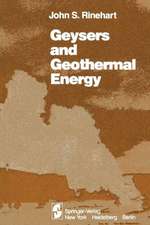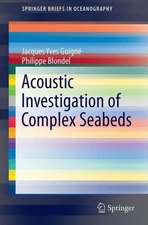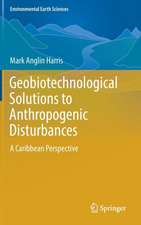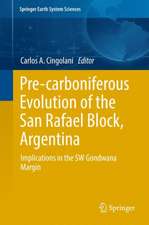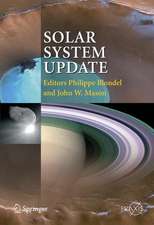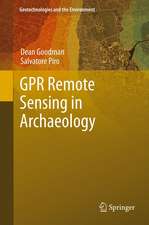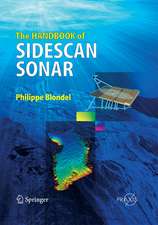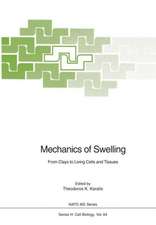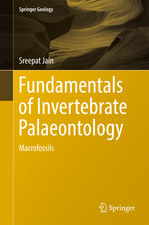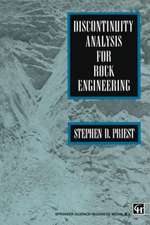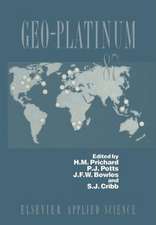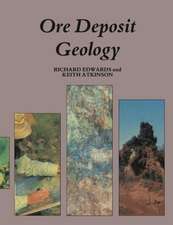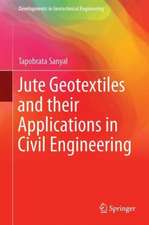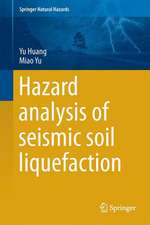Buried Waste in the Seabed – Acoustic Imaging and Bio-toxicity: Results from the European SITAR Project: Springer Praxis Books
Editat de Philippe Blondel, Andrea Caitien Limba Engleză Hardback – 13 oct 2006
| Toate formatele și edițiile | Preț | Express |
|---|---|---|
| Paperback (1) | 784.53 lei 38-44 zile | |
| Springer Berlin, Heidelberg – 12 feb 2010 | 784.53 lei 38-44 zile | |
| Hardback (1) | 951.91 lei 6-8 săpt. | |
| Springer Berlin, Heidelberg – 13 oct 2006 | 951.91 lei 6-8 săpt. |
Din seria Springer Praxis Books
-
 Preț: 294.46 lei
Preț: 294.46 lei -
 Preț: 223.45 lei
Preț: 223.45 lei -
 Preț: 193.12 lei
Preț: 193.12 lei -
 Preț: 167.85 lei
Preț: 167.85 lei -
 Preț: 288.98 lei
Preț: 288.98 lei -
 Preț: 323.74 lei
Preț: 323.74 lei -
 Preț: 401.38 lei
Preț: 401.38 lei -
 Preț: 264.12 lei
Preț: 264.12 lei - 8%
 Preț: 513.00 lei
Preț: 513.00 lei -
 Preț: 190.01 lei
Preț: 190.01 lei -
 Preț: 218.16 lei
Preț: 218.16 lei -
 Preț: 312.06 lei
Preț: 312.06 lei - 17%
 Preț: 414.04 lei
Preț: 414.04 lei -
 Preț: 216.41 lei
Preț: 216.41 lei -
 Preț: 262.27 lei
Preț: 262.27 lei -
 Preț: 264.35 lei
Preț: 264.35 lei -
 Preț: 167.63 lei
Preț: 167.63 lei -
 Preț: 284.81 lei
Preț: 284.81 lei -
 Preț: 259.08 lei
Preț: 259.08 lei -
 Preț: 305.47 lei
Preț: 305.47 lei -
 Preț: 244.14 lei
Preț: 244.14 lei -
 Preț: 227.85 lei
Preț: 227.85 lei -
 Preț: 285.25 lei
Preț: 285.25 lei -
 Preț: 295.56 lei
Preț: 295.56 lei -
 Preț: 357.17 lei
Preț: 357.17 lei -
 Preț: 275.79 lei
Preț: 275.79 lei -
 Preț: 257.08 lei
Preț: 257.08 lei -
 Preț: 349.71 lei
Preț: 349.71 lei -
 Preț: 272.45 lei
Preț: 272.45 lei -
 Preț: 270.27 lei
Preț: 270.27 lei - 8%
 Preț: 456.51 lei
Preț: 456.51 lei -
 Preț: 352.34 lei
Preț: 352.34 lei - 8%
 Preț: 394.80 lei
Preț: 394.80 lei -
 Preț: 320.65 lei
Preț: 320.65 lei -
 Preț: 325.29 lei
Preț: 325.29 lei -
 Preț: 253.11 lei
Preț: 253.11 lei -
 Preț: 192.86 lei
Preț: 192.86 lei -
 Preț: 313.40 lei
Preț: 313.40 lei -
 Preț: 150.51 lei
Preț: 150.51 lei -
 Preț: 233.34 lei
Preț: 233.34 lei -
 Preț: 286.78 lei
Preț: 286.78 lei -
 Preț: 212.01 lei
Preț: 212.01 lei -
 Preț: 366.83 lei
Preț: 366.83 lei -
 Preț: 299.99 lei
Preț: 299.99 lei -
 Preț: 232.27 lei
Preț: 232.27 lei -
 Preț: 284.58 lei
Preț: 284.58 lei -
 Preț: 212.45 lei
Preț: 212.45 lei -
 Preț: 159.81 lei
Preț: 159.81 lei -
 Preț: 349.48 lei
Preț: 349.48 lei - 20%
 Preț: 2061.61 lei
Preț: 2061.61 lei
Preț: 951.91 lei
Preț vechi: 1160.86 lei
-18% Nou
Puncte Express: 1428
Preț estimativ în valută:
182.14€ • 190.69$ • 150.72£
182.14€ • 190.69$ • 150.72£
Carte tipărită la comandă
Livrare economică 05-19 aprilie
Preluare comenzi: 021 569.72.76
Specificații
ISBN-13: 9783540281207
ISBN-10: 3540281207
Pagini: 260
Ilustrații: XXIV, 208 p. 112 illus., 12 illus. in color.
Dimensiuni: 170 x 242 x 20 mm
Greutate: 0.63 kg
Ediția:2007
Editura: Springer Berlin, Heidelberg
Colecția Springer
Seriile Springer Praxis Books, Geophysical Sciences
Locul publicării:Berlin, Heidelberg, Germany
ISBN-10: 3540281207
Pagini: 260
Ilustrații: XXIV, 208 p. 112 illus., 12 illus. in color.
Dimensiuni: 170 x 242 x 20 mm
Greutate: 0.63 kg
Ediția:2007
Editura: Springer Berlin, Heidelberg
Colecția Springer
Seriile Springer Praxis Books, Geophysical Sciences
Locul publicării:Berlin, Heidelberg, Germany
Public țintă
ResearchCuprins
The SITAR Project: background, goals, project structure.- The SITAR Project: background, goals, project structure.- Methods.- The parametric side-scan sonar instrument and synthetic aperture sonar processing.- Multiple-aspect scattering (MAS) measurements.- Acoustic models for scattering.- Biotoxicity measurements: the nanoinjection technique.- Processing tools for acoustic 3D images.- Geographic Information Systems for risk assessment of seabed dumping sites.- Experimental activities.- Scaled multiple-aspect scattering tank experiments.- Full-scale tank parametric side-scan sonar test.- The sea trial site in Möja Söderfjärd: biological sampling.- Acoustic sea trial in the Müja Süderfjärd dumpsite.- Results.- Geoacoustic inversion.- Buried waste localization: the parametric, synthetic aperture, side-scan sonar.- Buried waste inspection: acoustical images and inversion from multiple-aspect scattering.- Results of the biotoxicity measurements.- 3D acoustical image analysis and feature extraction.- Evaluation.- GIS-based data presentation system.- Biotoxicological methods.- Acoustical methods.- Conclusions.- Conclusions.
Textul de pe ultima copertă
Buried waste on the seabed is a major source of pollution. But, very often, waste sites are not known until a serious problem occurs, or are not adequately mapped. Recent examples around Europe include WWI and WWII ammunition dump sites (e.g. Beufort Dyke in the UK), dumped nuclear submarines in the Arctic Seas, clandestine or hidden toxic-waste in the Baltic Sea and the North Sea.. Even if properly documented, waste sites evolve with time (dumped material can move with currents and tides, especially on a scale of decades; toxic-material barrels can corrode and leak). This book shows the results of a concerted EU-funded effort to tackle this problem and find innovative ways to identify and map toxic waste sites ona the seabed, whether they have been covered with sediments or not. These results are applicable to any region on the seabed in the entire world.
